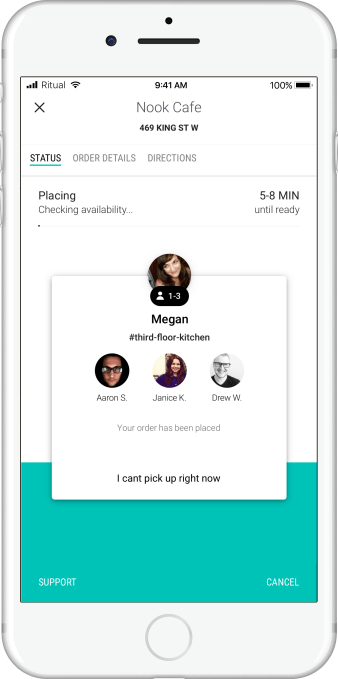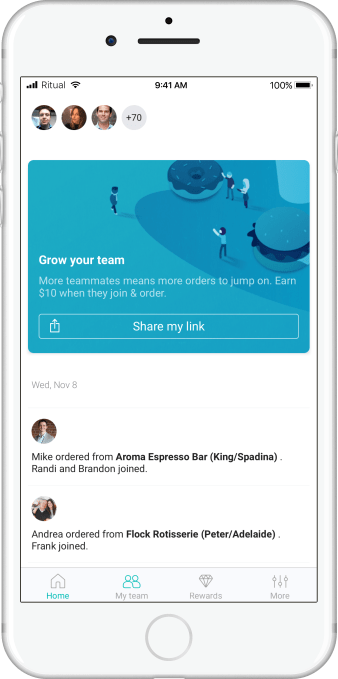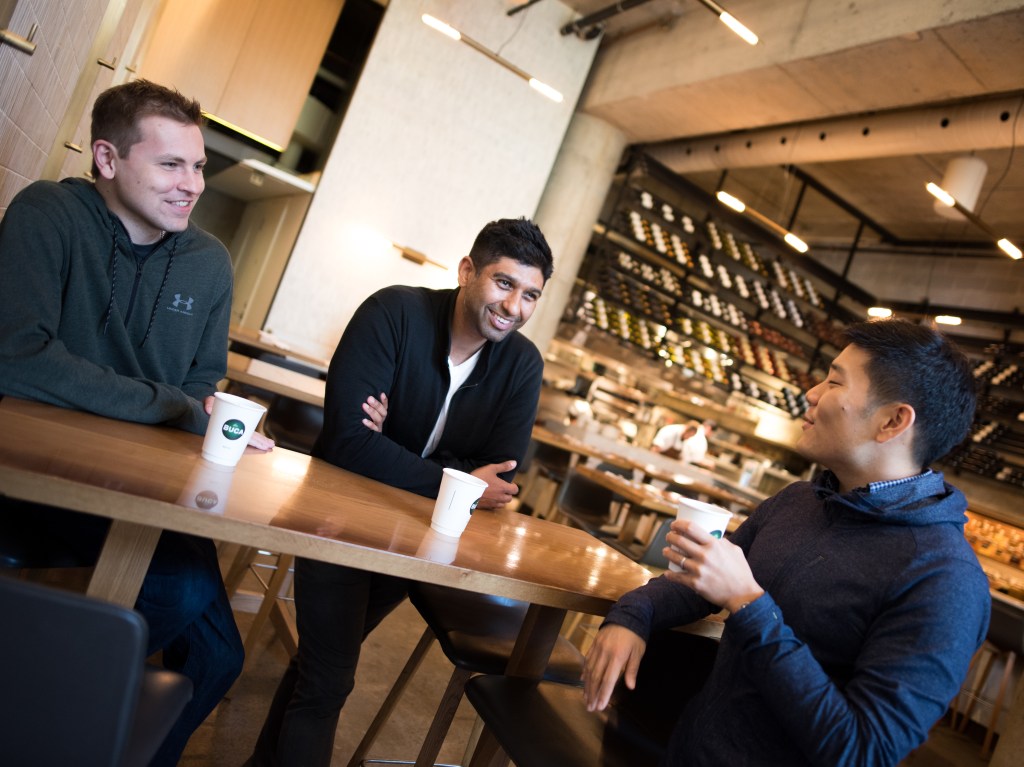While DoorDash, Postmates and other apps are looking to reimagine what the food delivery experience looks like, Ray Reddy says he wants to figure out what the next generation of a food court looks like. Sort of.
Reddy’s startup, Ritual, aims to remake the whole process of leaving your office and walking around five minutes to a nearby deli or cafe to pick up food for lunch. But Reddy and his Ritual founders, Larry Stinson and Robert Kim, wanted to focus first on getting that experience right for a single building that leaves to go pick up coffee or food — and has that daily ritual of getting lunch with the team, or something along those lines. The whole process boils down to an app for consumers to order food or drinks as well as have coworkers piggyback onto that order to create a more socialized experience around getting up and going around the corner for a snack. Ritual said it has raised a new $70 million round led by Georgian Partners, with existing investors Greylock Partners, Insight Ventures, and Mistral Venture Partners all participating.
“If we [couldn’t] build something that is compelling for the 300 people who work at this single building, it’s not gonna work period,” Redddy said. “That helped us define the problem narrowly. We thought, here are the 12 or 14 spots within a five minute walk of this building, let’s focus on simulating what would happen. Let’s not worry about financials or economics, let’s prove this works. Just like Uber’s a remote control for the real world, we viewed this in a similar way where ultimately the app is a remote control for a real world experience.”
Ritual’s main flow is probably something the typical user is accustomed to at this point when it comes to food. They pick a place they like, place an order for food (or coffee), and then go pick it up. But the whole background process involves not only getting restaurants on board with the specific things they want while still trying to calibrate a consistent experience that users at this point expect when it comes to ordering something online after being trained on that simplicity for years by Postmates, DoorDash, or even apps by companies like Starbucks.
But over the past year or so, the company has increasingly tuned itself to employees jumping aboard the same order when considering what to pick up for a snack or a meal. The whole process aims at emulating that experience of figuring out where you want to eat in a Slack channel or arguing over a Seamless order, and in the end whoever has time to run out and grab something will be able to bring things back for teammates (or, of course, everyone can leave at the same time). That whole process is called “piggybacking,” a feature the company introduced around 18 months ago. The company has around 44,500 teams using the app, Reddy said.

All this is aimed to help restaurants adapt to the same changes in user behavior that retail has seen in the past decade, Reddy said. Amazon trained users to buy things online, forcing retailers to shift their strategies, just as Postmates and DoorDash have trained users to order food delivery through apps and immediately have access to a ton of options. With all that comes more and more data, which has helped those industries slowly tune their models over time and try to keep up with the increase in demand that has come with reducing friction around the whole experience.
“What restaurants are seeing are right now the same challenges retailers saw 10 years ago,” Reddy said. “What does it mean to become omni-channel, how do you go from one customer segment to dealing with walk-ins plus digital orders. Retailers faced a lot of those challenges 10 years ago, they faced challenges around pricing, fulfillment, and how do they build new capabilities. They are dealing with a new source of demand, and fundamentally the problem was a lot of stores weren’t designed for accepting multi-channel origins.”
While an order-ahead app might be one way to connect online users to a physical location, there’s still plenty of work to do as most restaurants, coffee shops or typical stores aren’t tuned for a digital-first experience, Reddy said. That extends to even not having enough counter space to hold coffee cups that customers have ordered ahead of time, much less including things like NFC readers or QR codes — the latter of which has proved wildly popular and effective throughout Asia thanks to services like Alipay and WeChat. And that’s largely a result of iOS and Android, the main platforms in North America, not really doing a lot with QR codes for a very long time. Reddy said that North America was making some progress, especially when it came to NFC, but for now the company still has to figure out unique ways to connect users to those restaurants.

That can take a lot of different forms. While Ritual has to figure out how to create a seamless experience that covers a lot of different restaurants or shops, Reddy said the startup still has to offer those same stores some kind of control over the experience. That means giving those customers some value proposition beyond just telling them to sign up for another order-ahead app. Ritual, for example, lets restaurants who onboard Ritual customers themselves keep the full transaction for a purchase, while it takes a small slice off other transactions. That, in addition to other marketing options, helps restaurants control their own destiny, he said.
Of course, at its heart, it’s an order-ahead app — even with that social experience on top of it. And if you’ve ever looked at where to eat nearby with coworkers, you’ve probably checked Yelp or a few other places, and possibly even settled the argument with a giant order on an online ordering platform like DoorDash or Seamless. All these have already tapped that user experience, and it’s not clear if Ritual would be able to clear enough room should any one of them go after a similar experience while already having that customer and user relationship, in addition to being the spot customers go already. In the end, Reddy says that it’ll come down to users having a few apps, and hopes that by offering restaurants flexibility and focusing on the hyper-local idea of just a single office building will help build up that moat.
“The way that things have played out in Asia [with platforms like WeChat] is exactly striking the right balance between a platform and giving stores control,” Reddy said. “When you think of the consumer view, people — for the same reason you don’t have 10 retail apps — don’t have 10 food apps. You’re not gonna download an app for every neighborhood spot. It’s not that these apps are bad or don’t work well, people are just not gonna download 10 apps. There’s gonna be a handful of platforms people are going to use to access their neighborhoods. We have to have a unified platform, but give restaurant partners enough control, not only over being able to speak with their customers, but control for the look and feel of their storefront. That’s the middle ground we’re looking to find, which we think is a win for customers and our storefronts.”































Comment